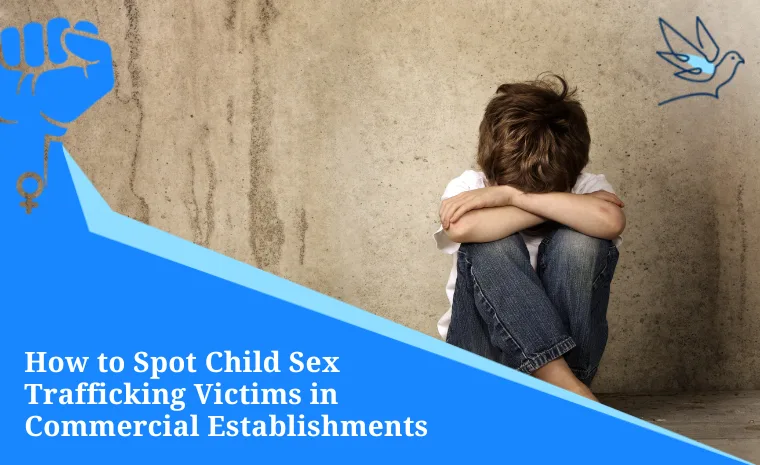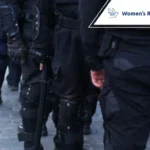How to Spot Child Sex Trafficking Victims in Commercial Establishments
Child sex trafficking victims are one of the most vulnerable and tragic groups affected by this heinous crime. California, with its diverse communities and busy commercial establishments, unfortunately, sees its share of child sex trafficking cases.
In this blog, we will explore how to spot child sex trafficking victims in commercial establishments, discuss the prevalence of this issue in California, and delve into the legal options available for child victims and the relevant laws in the state.
What is Child Sex Trafficking?
Sex trafficking is a criminal activity that involves the exploitation of children for labor, services, or engaging in commercial sexual activities.
According to the Trafficking Victims Protection Act of 2000 and its subsequent reauthorizations, sex trafficking is defined as follows:
- It includes instances where a commercial sex act is induced through force, fraud, or coercion, or when the person induced to engage in such acts is under 18 years of age.
- It encompasses actions like recruitment, harboring, transportation, provision, or obtaining of individuals for labor or services, achieved through the use of force, fraud, or coercion, with the ultimate goal of subjecting them to child pornography, involuntary servitude, peonage, debt bondage, or slavery.
Who is Most At Risk?
Child sex trafficking knows no boundaries when it comes to specific socioeconomic classes, races, ethnicities, or gender identities. It can impact individuals from all walks of life, spanning urban, suburban, rural, and tribal communities throughout California. The risk factors involved encompass:
Societal Factors
These involve the sexualization of children, including those related to:
- Gender-based violence
- Homophobia and transphobia
- Tolerance for the marginalization of others
- Lack of awareness about child trafficking
- Insufficient resources for exploited youth
- Social injustice and structural racism
- Acceptance of community and relationship violence
Community Factors
Vulnerability can be exacerbated in under-resourced schools and neighborhoods, areas with high levels of community violence. It also involves adherence to certain community social norms, the presence of gangs, a prevalence of commercial sex in the locality, transient male populations in the area, and poverty coupled with limited employment opportunities.
Relationship Factors
Risks increase when there are friends or family members involved in commercial sex, family dysfunction, intimate partner violence, caregiver loss or separation, poverty, and unemployment.
Individual Factors
Vulnerability is influenced by experiences of different forms of child abuse or neglect, such as:
- Homelessness or running away from home
- Misguided idea on sexual orientation
- Intellectual and/or developmental disabilities
- Behavioral or mental health issues
- Substance use
- Unaccompanied migration status
Recognizing the Signs of Child Sex Trafficking Victims
Child sex trafficking is a devastating crime that often goes unnoticed, but there are behavioral and outward appearance signs that can help identify potential victims. Keep an eye out for these indicators:
Tattoo Branding or Marking
Some sex traffickers use tattoos or branding to mark their victims as a form of control. Look for unusual or suspicious tattoos, especially if they are not age-appropriate.
Signs of Controlled Movement
Child sex traffickers exert extreme control over their victims, limiting their freedom to move or speak. Be cautious if you notice someone who seems constantly accompanied by another individual and appears fearful, submissive, or unable to make eye contact.
Inconsistent Stories
Child victims may give inconsistent or rehearsed explanations for their circumstances. Listen carefully to their stories and be wary if they avoid discussing their personal lives or appear overly coached.
Excessive Fear or Anxiety
Children who are victims of trafficking may exhibit signs of extreme fear, anxiety, or depression. They may also show signs of physical abuse, such as bruising or injuries.
Inability to Produce Identification
Traffickers often confiscate victims’ identification documents to control them. If a child cannot provide identification or seems hesitant to do so, it could be a red flag.
Are you a victim of sex trafficking?
Prevalence of Child Sex Trafficking Victims in California
California’s vast size and diverse population make it an attractive location for human traffickers. According to reports, California consistently ranks among the top states for reported cases of sex trafficking of children. Vulnerable populations, including runaways, foster children, and those facing economic hardship, are at higher risk of becoming victims.
Here are some key statistics on child sex trafficking in California:
- California had the highest number of reported human trafficking cases in the United States. According to the National Human Trafficking Hotline website, 24,046 victims have been identified since 2007. In 2021 alone, there were 2,122 victims involved in trafficking cases.
- The state’s proximity to the Mexican border and major urban areas contributes to its appeal for traffickers.
- LGBTQ+ youth, undocumented immigrants, and homeless youth are particularly vulnerable to exploitation.
Legal Options for Child Victims and Relevant Laws in California
Recognizing victims of child sex trafficking is the first step towards helping them. In California, there are laws in place to protect and support these young survivors:
- Safe Harbor Laws: California’s Safe Harbor laws decriminalize prostitution for minors involved in sex trafficking. Instead of being treated as offenders, these minor victims are in need of support and services.
- Child Protective Services (CPS): Suspected cases of child sex trafficking should be reported to CPS, which can investigate and provide protection and assistance to the child.
- Human Trafficking Laws: California has robust human trafficking laws, including severe penalties for traffickers and those who exploit minors.
When it comes to child sex trafficking cases in California, seeking legal counsel from an experienced sex trafficking lawyer is not just advisable; it’s essential. These legal professionals possess a profound understanding of California’s legal framework, particularly in cases involving false imprisonment related to sex trafficking. By enlisting the services of a skilled sex trafficking lawyer, you can ensure that your rights are safeguarded, and you receive fair and just legal representation tailored to your specific circumstances.
Here’s how a sex trafficking lawyer can be instrumental in your case:
- Expert Legal Counsel and Strategy: Sex trafficking lawyers provide victims with expert legal advice, guiding them through the complexities of the legal process. They formulate a well-thought-out legal strategy tailored to your case.
- Evidence Collection: These lawyers meticulously gather evidence of unlawful injury and psychological harm, constructing a compelling case against traffickers. This includes gathering medical records, witness statements, and other critical documentation.
- Witness Protection: Ensuring the safety of victims who testify against their traffickers is paramount. Sex trafficking lawyers arrange for witness protection measures to shield victims from potential harm.
- Collaboration with Law Enforcement: Sex trafficking lawyers work in close collaboration with law enforcement agencies to facilitate investigations. They provide valuable legal insights and support to law enforcement to ensure a thorough examination of the case.
- Advocacy for Victims: These lawyers serve as strong advocates for their clients, making sure that their voices are heard in court. They advocate for the rights and well-being of victims throughout the legal proceedings.
- Pursuing Perpetrators: Sex trafficking lawyers tirelessly work to bring traffickers to justice, holding them accountable for their actions. They employ their legal expertise to build a compelling case against perpetrators.
- Seeking Justice and Compensation: One of the primary objectives of sex trafficking lawyers is to fight for justice and compensation for victims. They help victims pursue compensation for bodily injuries and emotional trauma suffered during their ordeal.
In the challenging and emotionally taxing journey toward justice for child sex trafficking victims in California, a dedicated sex trafficking lawyer can be your unwavering advocate and legal ally, ensuring that those responsible for the heinous crimes are held accountable, and that victims receive the support and restitution they deserve.
Organizations in California: Support for Child Sex Trafficking Victims
There are numerous organizations in California dedicated to helping child sex trafficking victims. These organizations offer services such as shelter, counseling, legal assistance, and rehabilitation to help survivors rebuild their lives. Organization in California that can provide support include:

FAQs on Child Sex Trafficking in California
What is child sex trafficking, and how does it differ from other forms of child exploitation?
Child sex trafficking involves the recruitment, harboring, transportation, or receipt of minors for the purpose of child sexual exploitation. It differs from other forms of child exploitation in that it involves the commercial exchange of sex acts with minors, often under the control of traffickers.
What should I do if I suspect a child is a victim of sex trafficking in a commercial establishment?
If you suspect a child is a victim of sex trafficking, do not directly intervene. Instead, report to local law enforcement or Child Protection Services (CPS) immediately. They are trained to handle such situations and ensure the safety of the child.
Are there signs other than tattoos or markings that might indicate a child is being trafficked?
Yes, there are several signs to watch for in possibly exploited children, including excessive fear or anxiety, inconsistent stories, signs of physical abuse, and an inability to produce identification. Trust your instincts and report any suspicious behavior.
What are the penalties for traffickers in California?
California has strict laws against human trafficking, including child sex trafficking. Convicted traffickers can face significant prison sentences and fines. The severity of the penalties depends on the circumstances of the case.
Are there any educational resources available for businesses and employees to learn about identifying and reporting child sex trafficking in commercial establishments?
Yes, there are training programs and resources available for businesses and employees to learn about identifying and reporting child sex trafficking. Many organizations and law enforcement agencies offer online and in-person training sessions to help raise awareness and empower individuals to take action.
How can we work together as a community to prevent child sex trafficking in California?
Community involvement is vital in preventing child sex trafficking. Engage in community awareness campaigns, support local organizations working against trafficking, and educate others about the signs and risks. By working together, we can create a safer environment for children in California and beyond.
Get the Help You Need
Identifying and assisting child sex trafficking victims in California is a critical endeavor. By being vigilant and informed, we can help rescue these young individuals from the horrors of exploitation and ensure they receive the protection and support they desperately need. Together, we can make a difference and combat this grave issue plaguing our communities.
If you or a loved one are a survivor of sex trafficking, it is crucial to take action and seek assistance. The Women’s Rights Group is a nationwide organization firmly committed to aiding individuals who have endured sexual violence within commercial settings.
Our team is equipped to offer essential support, guiding you through the intricate and challenging process. We can assist in accessing both medical care and legal representation. Do not hesitate to contact us. Call us at (844) 240-4967 for a free confidential consultation.
Remember, help and support are within reach.






